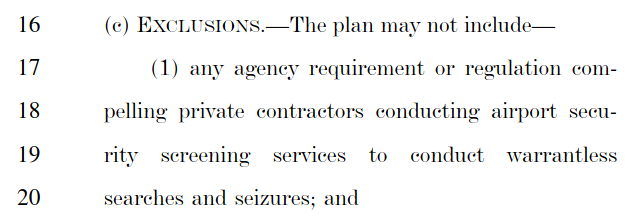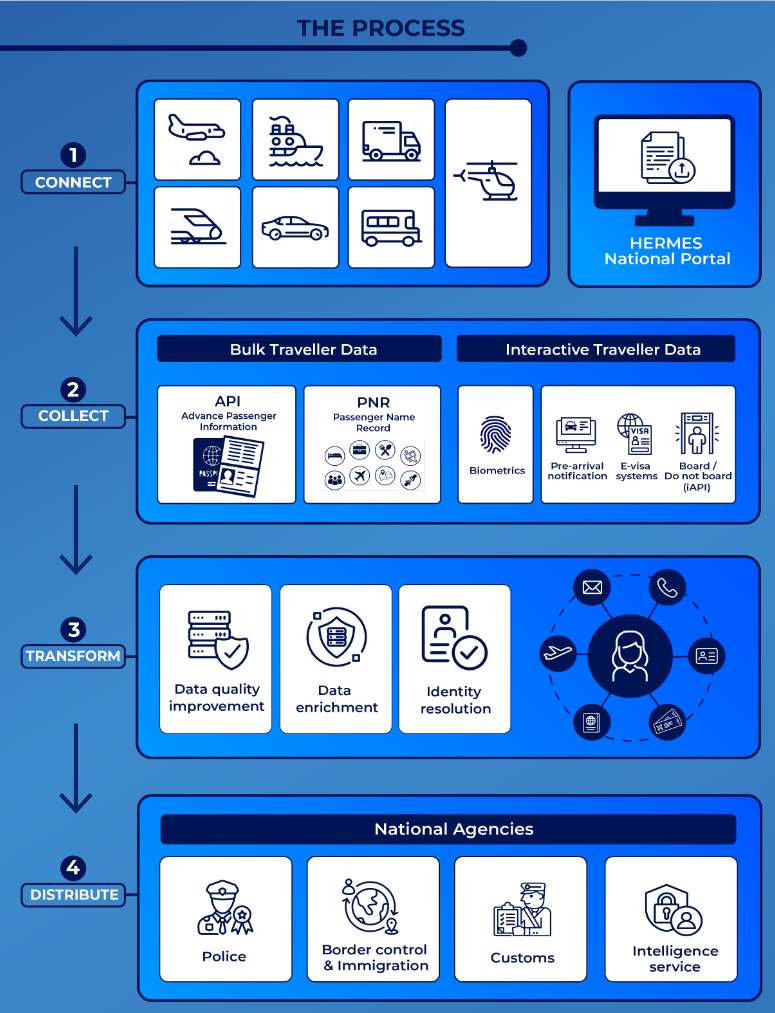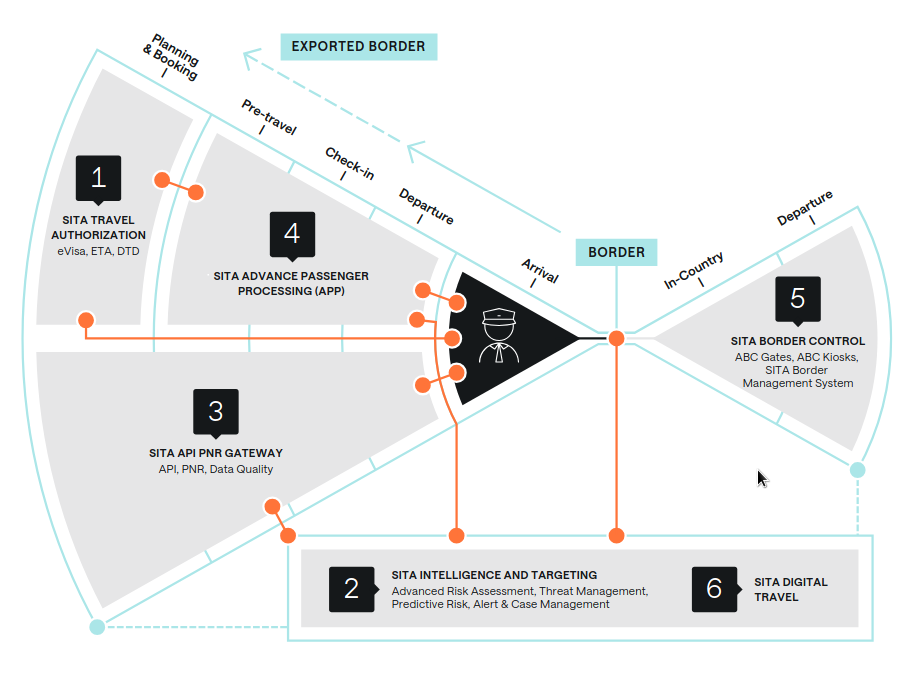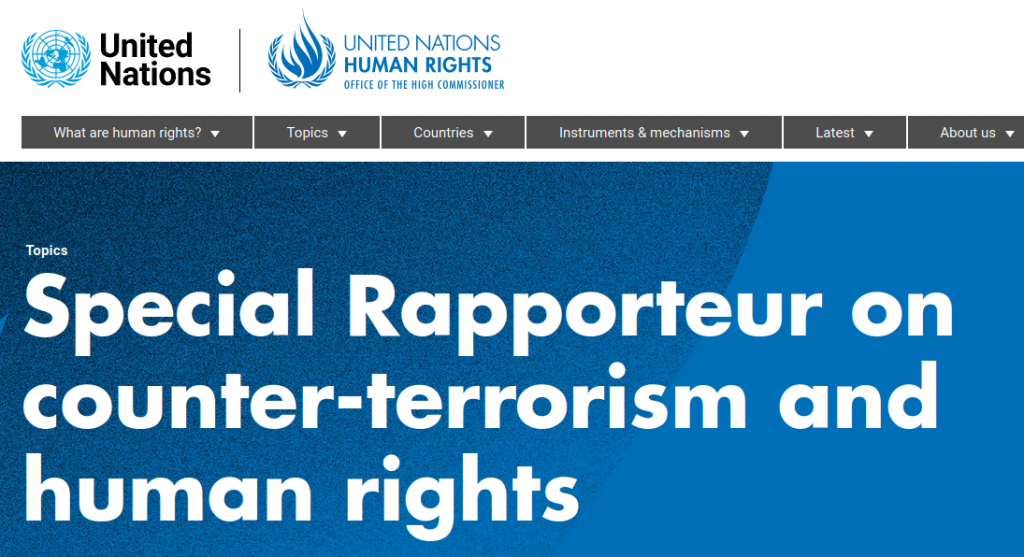REAL-ID FAQ: What will happen at US airports on May 7, 2025?
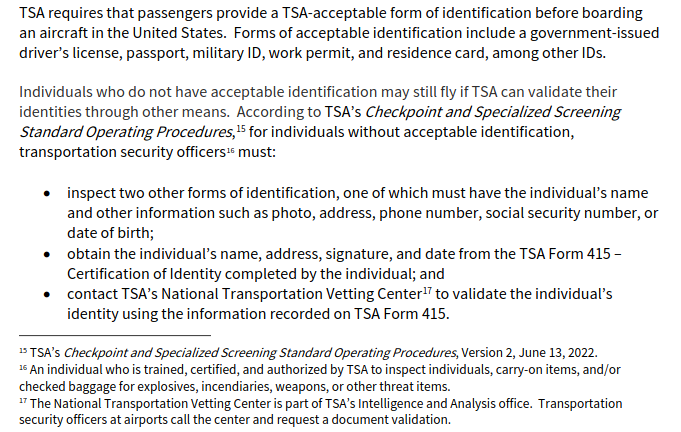
[Summary of TSA procedures for airline passengers with no ID or unacceptable ID, from DHS Office of Inspector General report OIG-2024-65, September 2024]
What does this mean if you want to fly but don’t have any of the types of ID that the TSA deems compliant with the REAL-ID Act (including a US or foreign passport, a US passport card, a Canadian provincial driver’s license, or a US driver’s license or state ID with a REAL-ID gold star in the upper right corner or that is marked as an “Enhanced Drivers License”)?
The key thing to know is that — unless the TSA makes undisclosed changes to its procedures — air travelers with “noncompliant” ID on or after May 7, 2025, should be treated, and should be allowed to fly, the same way people with no ID fly today.
We can’t predict with certainty what the TSA will do on May 7th, because:
- The TSA has been violating the law for years with its ID procedures at airports, including through illegal demands for ID, illegal demands for information, and illegal use of an unapproved ID verification form.
- No laws or regulations prescribe the TSA’s checkpoint procedures, including ID checks. The law says only that airline passengers must “submit” to “screening”, without defining either of those terms. Courts have defined “screening” as “search”, with no indication that this includes questioning about, or evidence of, identity.
- The TSA has claimed that its internal “Standard Operating Procedures” (SOPs) for ID checks, before or after May 7, 2025, aren’t binding on the TSA, create no legal rights for airline passengers, and can be secretly changed at any time.
- The SOPs purport to grant discretion to TSA staff at each airport to decide who to allow, and who not to allow, to exercise their right to airline travel by common carrier, for any or no reason, regardless of what if any ID travelers show.
- The TSA has purported to grant itself the authority to change even its published “rules” at any time, without notice, merely by posting new non-rules on its website. It hasn’t done so yet, nor has it published any of the other notices in the Federal Register that would be required by the Privacy Act and the Paperwork Reduction Act to establish a “graduated enforcement” scheme. The New York Times reported on April 9th that “a T.S.A. spokesperson said on Friday that the agency had decided that the phased approach was not necessary and that full enforcement would begin on May 7”, but that decision could be reversed at any time, before or after May 7th.
- The Trump 2.0 Administration in general and the Department of Homeland Security (DHS) in particular have been changing and sometimes reversing their directives in many other areas, without warning and with little or no basis in law or overall policy, and could do the same with directives to the TSA.
With these uncertainties in mind, what can we say about what will be required and will happen at airports on May 7th?
Does the law require you to have ID to fly?
No.
The TSA itself has stated repeatedly in court, under oath, in litigation in which The Identity Project and individuals we support have been involved, that no Federal law or regulation requires airline passengers to have, carry, or show any ID.
See e.g. State of New Mexico v. Phillip Mocek, in which a TSA witness testified that, “It [flying without ID] happens all the time. We have a procedure for that”, and Gilmore v. Gonzales, in which the 9th Circuit Court of Appeals found, based on the TSA’s own submissions to the court, that, “Gilmore had a meaningful choice. He could have presented identification, submitted to a search, or left the airport. That he chose the latter does not detract from the fact that he could have boarded the airplane had he chosen one of the other two options.”
People fly without ID every day, openly and legally.
Years-delayed responses by the TSA to our Freedom Of Information Act (FOIA) requests show that, as of 2016, almost 2,000 people a day were allowed through TSA checkpoints at airports nationwide with no ID or with ID that was deemed “unacceptable”. TSA incident logs released in response to our FOIA requests show that 98% of travelers who showed up at airports with no ID or with “unacceptable” ID were allowed to fly after undergoing additional questioning and/or more intrusive searches and groping (“screening”).
Will the REAL-ID Act require you to have ID to fly on or after May 7, 2025?
No.
The REAL-ID Act governs which IDs can be accepted by Federal agencies such as the TSA in circumstances where ID is required. It doesn’t create any new requirements to have, carry, or show any ID in circumstances — such as airline travel — where ID is not required by some other law.
According to the latest TSA statement on April 11, 2025:
Passengers who present a state-issued identification that is not REAL ID compliant and who do not have another acceptable alternative (e.g., passport) can expect to face delays, additional screening and the possibility of not being permitted into the security checkpoint…. TSA … will continue with additional screening measures for those without a REAL ID until it is no longer considered a security vulnerability.
This doesn’t say that individuals without REAL-ID, or without any ID, will be prevented from flying. All it says is that these individuals will be subjected to “additional screening” (which of course may occasion delay) and the “possibility” of not being permitted into the checkpoint (i.e. if they don’t agree to submit to additional searches).
What will happen if you show up at the airport on or after May 7, 2025, with “noncompliant” state-issued ID?
So far as we can tell, airline passengers who show up at TSA checkpoints on or after May 7, 2025, with noncompliant ID or no ID will be treated the same way travelers with “unacceptable” ID (expired IDs, student IDs, IDs issued by private employers, etc.) or no ID at all (lost or stolen or forgotten or just don’t have ID) are treated now.
What is the TSA’s standard procedure for people with no ID or “unacceptable” ID?
We don’t have up-to-date, unredacted versions of the TSA’s instructions to checkpoint staff at airports. But based on previously-released versions of the TSA’s Standard Operating Procedures(SOPs) for Travel Document and ID Checks and for the TSA’s ID Verification Call Center (IVCC), TSA testimony and pleading in court cases, TSA ID verification logs and incident reports released in response to our FOIA requests, reports we’ve received from travelers without ID, the most recent 2024 report from the DHS Office of Inspector General on procedures for airline passengers without ID or with unacceptable ID, TSA testimony to Congress in 2024, and our own experiences, here’s what happens when a ticketed airline passenger shows up at a TSA checkpoint with no ID or “unacceptable” ID:
